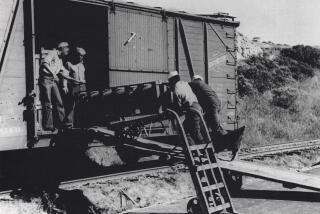Forever in Their Debt
- Share via
Under battleship gray skies, a bell sounded solemnly, 52 times. With each ring, a carnation was tossed into a reflecting pond, a little American flag was pushed into the grass, and a name was called.
“USS Sealion . . . USS Runner . . . USS Swordfish . . .”
The 52 submarines that were lost during World War II and the 3,205 men who died aboard them were remembered Monday during a colorful and solemn Memorial Day service at the U.S. Naval Weapons Station in Seal Beach.
“Let it be remembered that the freedom we enjoy today is in part because a small bunch of Americans volunteered their lives” to serve aboard submarines, despite 1-in-4 odds of returning alive, said one speaker.
“These are eternally young men, on eternal patrol,” veteran William Hagendorn told the crowd of more than 200.
The ceremony, presented by the Los Angeles area chapter of the U.S. Submarine Veterans of World War II, was one of many held throughout Orange County Monday to honor the nation’s war dead.
In a Corona del Mar cemetery, doves were released as war heroes were remembered. In Cypress, veterans’ groups marched to salute those who served, from the Spanish-American War to Operation Desert Storm. Firefighters of the armed services were honored in Fullerton, patriotic songs were sung in Huntington Beach, and a special Mass was said at a Catholic cemetery in Orange.
While veterans’ groups remembered the traditional meaning of Memorial Day, thousands of others celebrated the holiday as the unofficial start of summer, despite the cloudy skies and mild temperatures.
At the Laguna Beach shore alone, about 15,000 people tried to catch some sun.
“It’s been just real mellow,” said lifeguard Mark Sproull.
About 10,000 ventured to Bolsa Chica State Beach, where the biggest problem was the sting of stingrays in the shallow surf, a lifeguard said. Seal Beach had about 4,000 beach-goers.
The next several days should be more of the same, said John Sherwin of Weather Data Inc., which provides forecasts for The Times. Morning clouds should clear to hazy sunshine by afternoon, with high temperatures in the mid-60s along the coast to the low 70s inland, he said.
The morning breeze Monday ruffled the abundant flags at the Seal Beach service, where submarine veterans dressed in natty blue-and-gold vests and matching hats and members of the public gathered at the World War II memorial--a semicircle of 52 plaques and state flags, each representing a downed submarine.
After two young sisters dressed in colonial-style dresses recited a poem about the flag, the audience listened to retired Navy Cmdr. Lloyd “Pete” Bucher, who was in charge of the USS Pueblo when the ship was shelled and then seized by North Korea in 1968. One crewman was killed, and Bucher and the others aboard were held prisoner for 11 months.
Bucher, now 70 and living in Poway, also served in World War II and Vietnam.
He noted that as a new millennium approaches, “only a small percentage of elected officials have had military experience” and called on the audience to protest efforts that would cut back the armed services “to a level of social service providers.” He also reflected on the fate of the WWII submarine USS Runner, which disappeared in the waters near Japan and was presumed to have hit a mine.
So many submarines were lost in WWII, Hagendorn told the crowd, because the vessels had never been used in combat before and the torpedoes turned out to be “flawed weapons” that often did not explode when they hit enemy ships. The money saved on the ineffective torpedoes “was paid for with the blood of the young men whose names are on those plaques,” he said, gesturing to the memorial.
Then the “calling of the boats,” punctuated by the tolling of the bell, began.
Wives of the submarine veterans tossed red, white and blue carnations into the memorial’s reflecting pond as each submarine’s name was read, along with a synopsis of the crew’s fate.
A veteran at each submarine’s plaque decorated his station with an American flag.
An anchor-shaped wreath of flowers was passed around the memorial before it, too, was floated in the pond, to the singing of “Amazing Grace.”
After several widows of submarine crewmen added flowers to the pond, a bugler concluded the ceremony with “Taps.”
More to Read
Sign up for Essential California
The most important California stories and recommendations in your inbox every morning.
You may occasionally receive promotional content from the Los Angeles Times.













